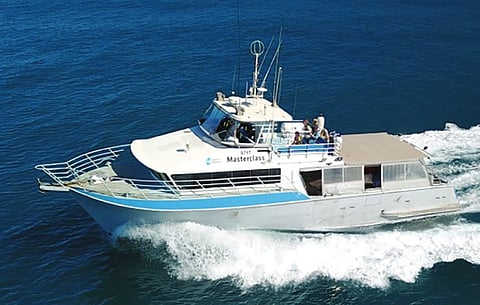AWARDS 2023 | Best Small Training Vessel – Master Class – Dongara Marine
This was a very interesting project that illustrates the great potential for re-cycling of well designed and built aluminium vessels even when they are twenty or more years old.
Given a sound vessel, a refit or rebuild, even as extensive as this one was, can result in what is really a "better than new" boat that should serve very capably and economically for at least another two decades.
"With our long association with the maritime industry in the Mid West, including the commercial fishing fleets, everyone on our team was very pleased to undertake this major upgrade," Rohan Warr, Managing Director of Dongara Marine, told Baird Maritime. "It enabled us to contribute to the development of the region's maritime workforce by providing the local TAFE with a significantly enhanced training platform."
Warr remarked that refit projects come with a degree of uncertainty, especially in the case of an old boat constructed by another builder.
"You can't plan and account for everything you are going to find when you start taking out the old and putting in the new. However, a really pleasing outcome of the project was that it demonstrated our new facility on the Geraldton waterfront has made undertaking refit and upgrade projects such as this far more viable and efficient for clients."
Another benefit of the project involving Master Class was that it allowed Dongara Marine to see how different vessel designers, builders, and contractors worked, as well as what maintenance challenges emerge on vessels over time.
There are always a few ideas and things that we file away as lessons – some in the 'that's a good idea' file and some in the 'that creates problems' file. That's the kind of knowledge we can and do use to improve and inform how we do things on our new boats and our refits."
Warr said that one of the trends that are coming more into play in the work boat and fishing boat sector revolves around crew issues. The future will be marked by greater emphasis on crew comfort delivered through larger boats, better quality fittings and finishes, and considerations of motion and onboard noise increasing in prominence. For Warr, Dongara Marine is well-positioned in that regard, at least in part to the company's composite wheelhouse technology but also emerging experience with fitting gyrostabilisers.
"Reducing crew requirements and workloads through technology and systems is something we also foresee coming into play. All of this addresses that it is harder to find people willing to take on seagoing jobs, and the crew costs that come with that."
In the general market, Warr anticipates that there will be demand for windfarm service vessels as the Australian offshore wind market develops. There is considerable experience among European countries with regard to such vessels, and this will lead to the next step of taking proven technology and modifying it for the Australian context including regulatory requirements.
"While we have some specific strategic goals, in some ways our business plan is very straightforward: to be adaptable and listen to what clients and the broader market wants. We aren't trying to drive the market in certain directions or towards certain technologies.
"Of course, we keep an eye on what suppliers and other shipbuilders are doing, but that's so that we are informed so that we can provide informed advice and offer alternatives to customers, all while being mindful that it's their choice at the end of the day."
Warr remarked that Dongara Marine is open to different construction materials, different vessel types and designs, and different equipment choices, so long as it can be accommodated in the company's facilities.
"As with all types of manufacturing, construction, and other industries requiring skilled tradespeople, shipbuilding is being impacted by challenges in finding skilled and experienced tradespeople," Warr told Baird Maritime.
"In Western Australia, that is especially impacted by the mining industry demand and wage structures. So, while working in a company like ours has definite advantages – the satisfaction of being able transform new and interesting vessels from designs to functioning reality, the ability to go home every night, to work in indoors in modern facilities and so forth – it's still a challenge to get staff, especially in specialist areas."
Warr added that, as naval programs enter the pipeline, the challenges are likely to be exacerbated further. For that reason, there is an emphasis on training the future workforce through apprenticeships, though he admits such a measure can only go so far.
"On a positive note, most of the supply chain issues we were suffering from during and immediately post-pandemic have moderated, so obtaining equipment in a timely manner is not such a pressing issue. On the flipside, we are seeing substantial price increases in many areas.
"Combined with wage growth to combat the skills shortages and cost of living, it is making boats more expensive to build, so for buyers, we honestly think there is a real case to move early if new boats are planned."
Warr also anticipates that local cost issues, especially when combined with outdated price expectations, will see more buyers considering having new boats built in countries where labour and compliance costs are lower, and there are already well-known examples of this. There are also examples where strategies have not brought about the results that customers expect due to issues related to quality, warranty support, Australian standards, and schedule.
"We don't have plans to move production offshore, and we have never aimed to be the cheapest supplier, but of course we are always trying to improve efficiencies and keep overheads low. Most importantly, we will continue to provide the peace of mind of a high-quality Australian build with Australian-sourced and -supported equipment. We think many buyers still recognise the long-term value in that."
For a list of the 2023 "Best Of" award winners, please click here.



